Association of Schools and Programs of Public Health
VerifiedAdded on 2022/08/31
|12
|3496
|33
AI Summary
Contribute Materials
Your contribution can guide someone’s learning journey. Share your
documents today.
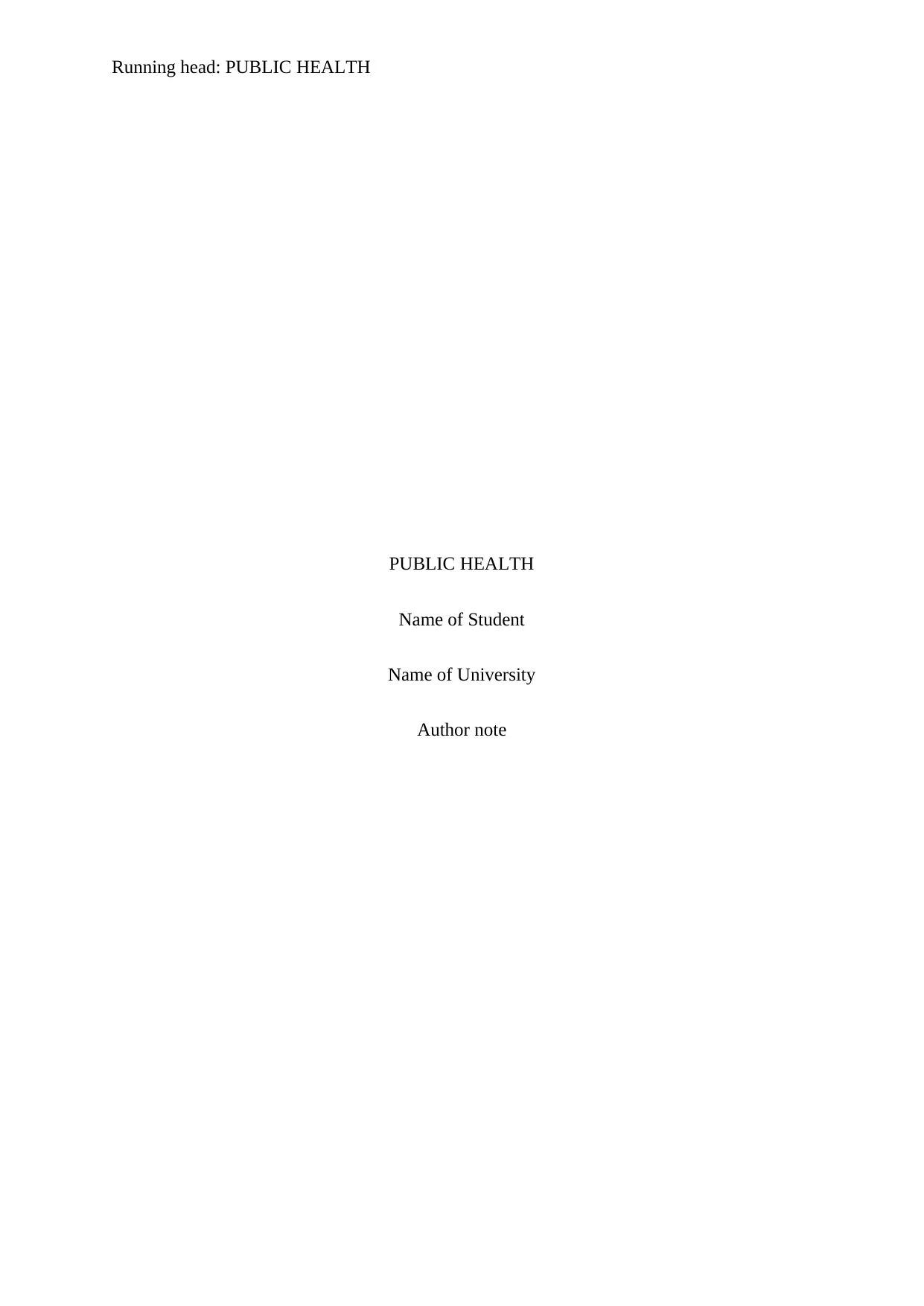
Running head: PUBLIC HEALTH
PUBLIC HEALTH
Name of Student
Name of University
Author note
PUBLIC HEALTH
Name of Student
Name of University
Author note
Secure Best Marks with AI Grader
Need help grading? Try our AI Grader for instant feedback on your assignments.
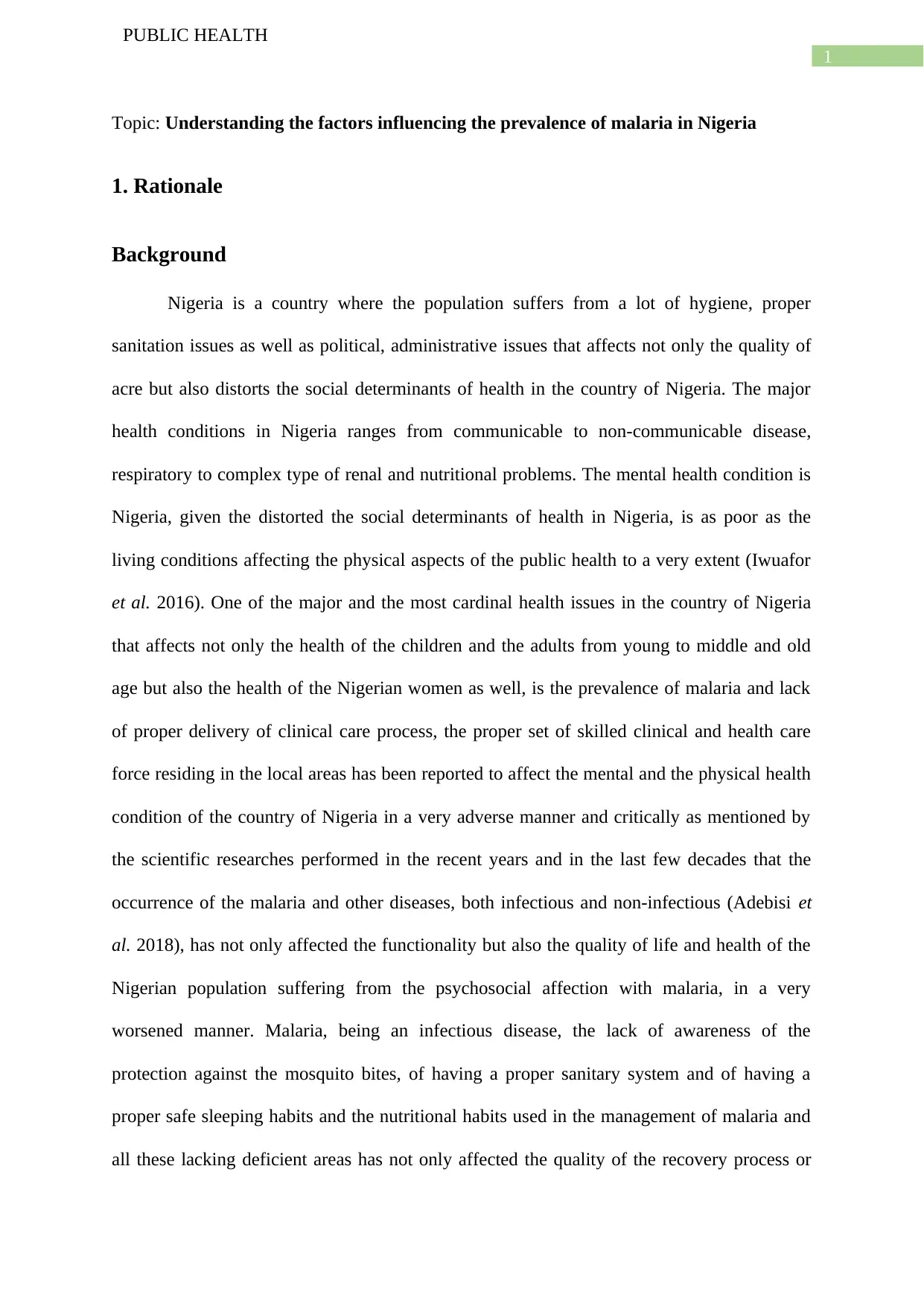
1
PUBLIC HEALTH
Topic: Understanding the factors influencing the prevalence of malaria in Nigeria
1. Rationale
Background
Nigeria is a country where the population suffers from a lot of hygiene, proper
sanitation issues as well as political, administrative issues that affects not only the quality of
acre but also distorts the social determinants of health in the country of Nigeria. The major
health conditions in Nigeria ranges from communicable to non-communicable disease,
respiratory to complex type of renal and nutritional problems. The mental health condition is
Nigeria, given the distorted the social determinants of health in Nigeria, is as poor as the
living conditions affecting the physical aspects of the public health to a very extent (Iwuafor
et al. 2016). One of the major and the most cardinal health issues in the country of Nigeria
that affects not only the health of the children and the adults from young to middle and old
age but also the health of the Nigerian women as well, is the prevalence of malaria and lack
of proper delivery of clinical care process, the proper set of skilled clinical and health care
force residing in the local areas has been reported to affect the mental and the physical health
condition of the country of Nigeria in a very adverse manner and critically as mentioned by
the scientific researches performed in the recent years and in the last few decades that the
occurrence of the malaria and other diseases, both infectious and non-infectious (Adebisi et
al. 2018), has not only affected the functionality but also the quality of life and health of the
Nigerian population suffering from the psychosocial affection with malaria, in a very
worsened manner. Malaria, being an infectious disease, the lack of awareness of the
protection against the mosquito bites, of having a proper sanitary system and of having a
proper safe sleeping habits and the nutritional habits used in the management of malaria and
all these lacking deficient areas has not only affected the quality of the recovery process or
PUBLIC HEALTH
Topic: Understanding the factors influencing the prevalence of malaria in Nigeria
1. Rationale
Background
Nigeria is a country where the population suffers from a lot of hygiene, proper
sanitation issues as well as political, administrative issues that affects not only the quality of
acre but also distorts the social determinants of health in the country of Nigeria. The major
health conditions in Nigeria ranges from communicable to non-communicable disease,
respiratory to complex type of renal and nutritional problems. The mental health condition is
Nigeria, given the distorted the social determinants of health in Nigeria, is as poor as the
living conditions affecting the physical aspects of the public health to a very extent (Iwuafor
et al. 2016). One of the major and the most cardinal health issues in the country of Nigeria
that affects not only the health of the children and the adults from young to middle and old
age but also the health of the Nigerian women as well, is the prevalence of malaria and lack
of proper delivery of clinical care process, the proper set of skilled clinical and health care
force residing in the local areas has been reported to affect the mental and the physical health
condition of the country of Nigeria in a very adverse manner and critically as mentioned by
the scientific researches performed in the recent years and in the last few decades that the
occurrence of the malaria and other diseases, both infectious and non-infectious (Adebisi et
al. 2018), has not only affected the functionality but also the quality of life and health of the
Nigerian population suffering from the psychosocial affection with malaria, in a very
worsened manner. Malaria, being an infectious disease, the lack of awareness of the
protection against the mosquito bites, of having a proper sanitary system and of having a
proper safe sleeping habits and the nutritional habits used in the management of malaria and
all these lacking deficient areas has not only affected the quality of the recovery process or
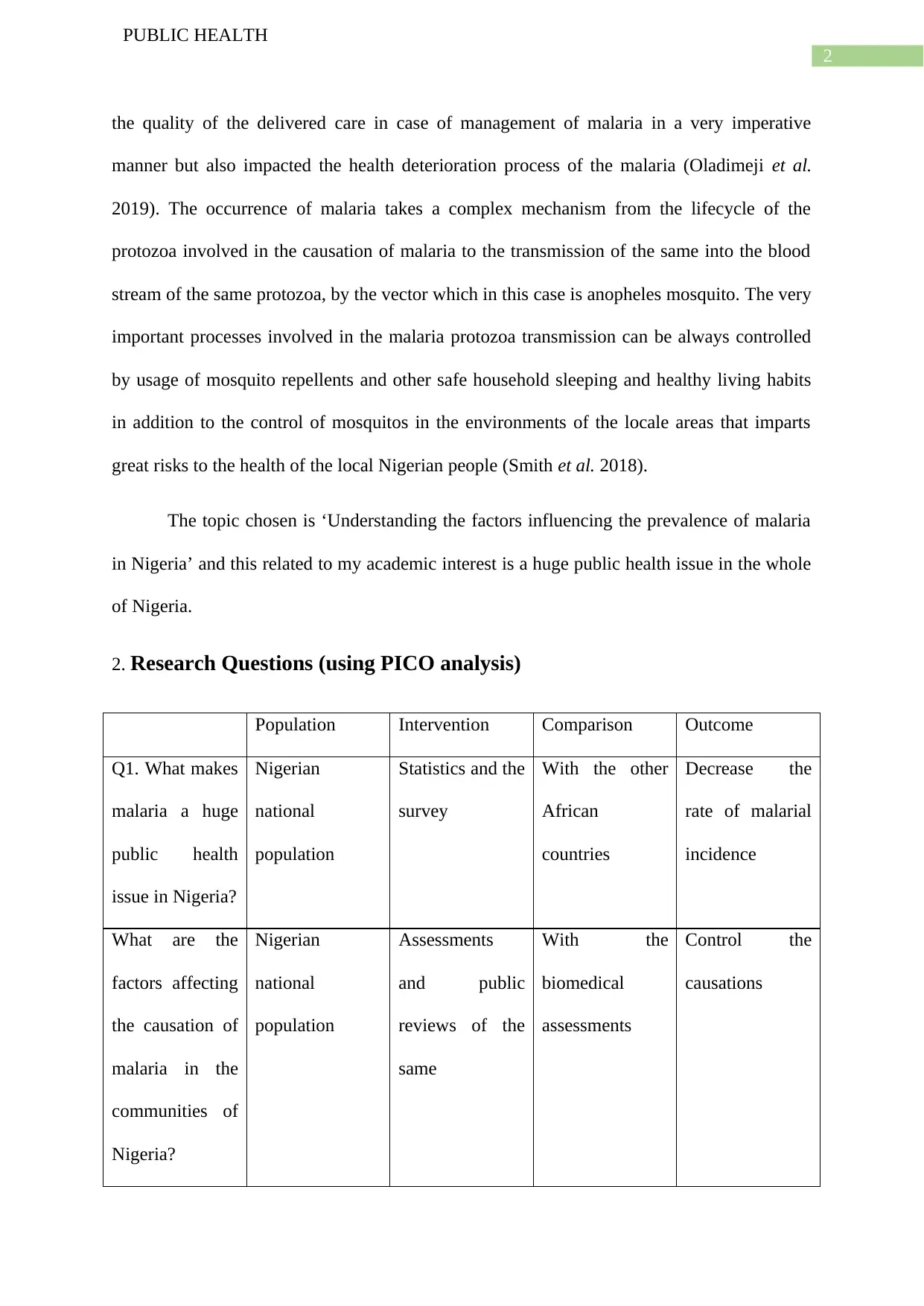
2
PUBLIC HEALTH
the quality of the delivered care in case of management of malaria in a very imperative
manner but also impacted the health deterioration process of the malaria (Oladimeji et al.
2019). The occurrence of malaria takes a complex mechanism from the lifecycle of the
protozoa involved in the causation of malaria to the transmission of the same into the blood
stream of the same protozoa, by the vector which in this case is anopheles mosquito. The very
important processes involved in the malaria protozoa transmission can be always controlled
by usage of mosquito repellents and other safe household sleeping and healthy living habits
in addition to the control of mosquitos in the environments of the locale areas that imparts
great risks to the health of the local Nigerian people (Smith et al. 2018).
The topic chosen is ‘Understanding the factors influencing the prevalence of malaria
in Nigeria’ and this related to my academic interest is a huge public health issue in the whole
of Nigeria.
2. Research Questions (using PICO analysis)
Population Intervention Comparison Outcome
Q1. What makes
malaria a huge
public health
issue in Nigeria?
Nigerian
national
population
Statistics and the
survey
With the other
African
countries
Decrease the
rate of malarial
incidence
What are the
factors affecting
the causation of
malaria in the
communities of
Nigeria?
Nigerian
national
population
Assessments
and public
reviews of the
same
With the
biomedical
assessments
Control the
causations
PUBLIC HEALTH
the quality of the delivered care in case of management of malaria in a very imperative
manner but also impacted the health deterioration process of the malaria (Oladimeji et al.
2019). The occurrence of malaria takes a complex mechanism from the lifecycle of the
protozoa involved in the causation of malaria to the transmission of the same into the blood
stream of the same protozoa, by the vector which in this case is anopheles mosquito. The very
important processes involved in the malaria protozoa transmission can be always controlled
by usage of mosquito repellents and other safe household sleeping and healthy living habits
in addition to the control of mosquitos in the environments of the locale areas that imparts
great risks to the health of the local Nigerian people (Smith et al. 2018).
The topic chosen is ‘Understanding the factors influencing the prevalence of malaria
in Nigeria’ and this related to my academic interest is a huge public health issue in the whole
of Nigeria.
2. Research Questions (using PICO analysis)
Population Intervention Comparison Outcome
Q1. What makes
malaria a huge
public health
issue in Nigeria?
Nigerian
national
population
Statistics and the
survey
With the other
African
countries
Decrease the
rate of malarial
incidence
What are the
factors affecting
the causation of
malaria in the
communities of
Nigeria?
Nigerian
national
population
Assessments
and public
reviews of the
same
With the
biomedical
assessments
Control the
causations
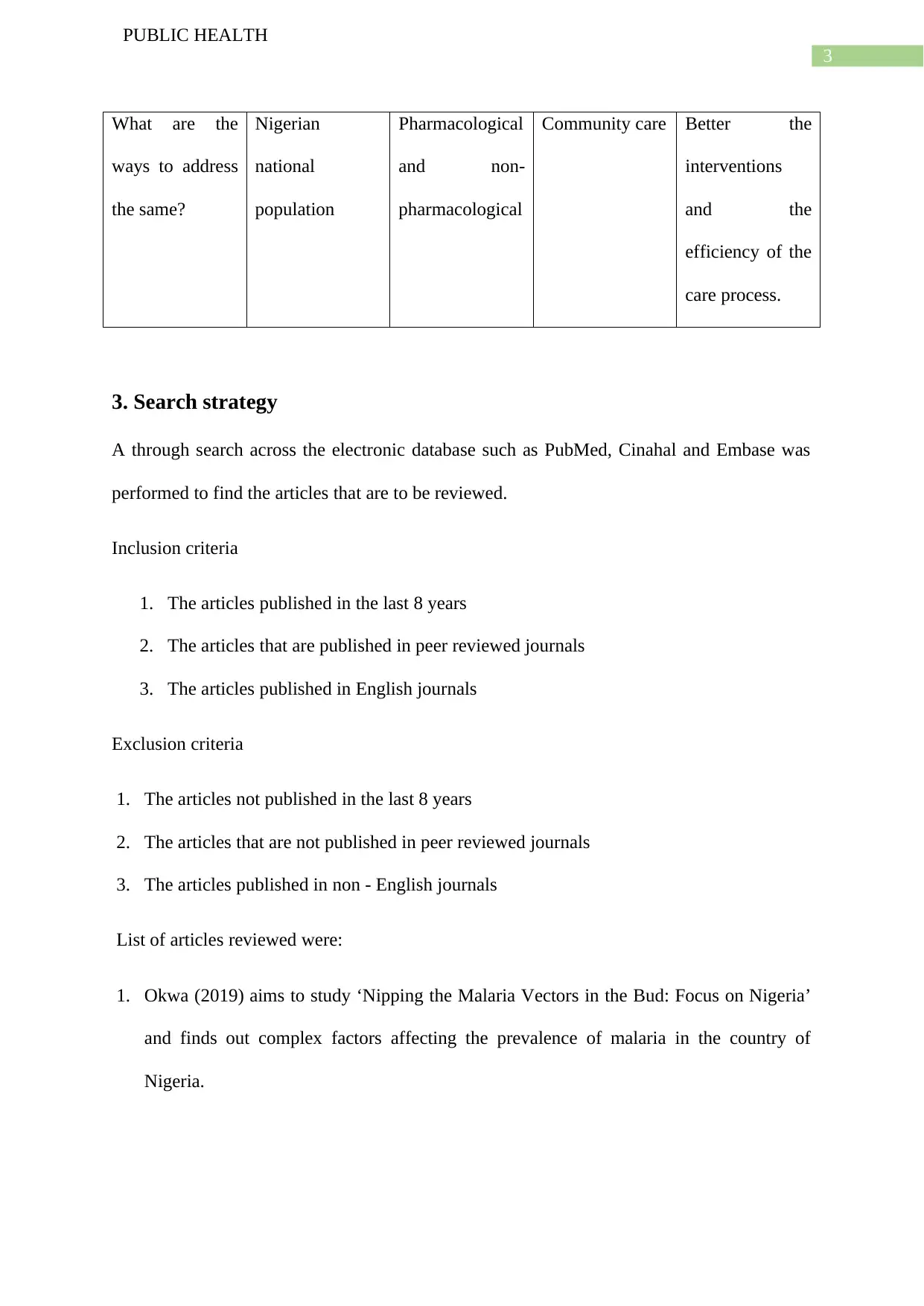
3
PUBLIC HEALTH
What are the
ways to address
the same?
Nigerian
national
population
Pharmacological
and non-
pharmacological
Community care Better the
interventions
and the
efficiency of the
care process.
3. Search strategy
A through search across the electronic database such as PubMed, Cinahal and Embase was
performed to find the articles that are to be reviewed.
Inclusion criteria
1. The articles published in the last 8 years
2. The articles that are published in peer reviewed journals
3. The articles published in English journals
Exclusion criteria
1. The articles not published in the last 8 years
2. The articles that are not published in peer reviewed journals
3. The articles published in non - English journals
List of articles reviewed were:
1. Okwa (2019) aims to study ‘Nipping the Malaria Vectors in the Bud: Focus on Nigeria’
and finds out complex factors affecting the prevalence of malaria in the country of
Nigeria.
PUBLIC HEALTH
What are the
ways to address
the same?
Nigerian
national
population
Pharmacological
and non-
pharmacological
Community care Better the
interventions
and the
efficiency of the
care process.
3. Search strategy
A through search across the electronic database such as PubMed, Cinahal and Embase was
performed to find the articles that are to be reviewed.
Inclusion criteria
1. The articles published in the last 8 years
2. The articles that are published in peer reviewed journals
3. The articles published in English journals
Exclusion criteria
1. The articles not published in the last 8 years
2. The articles that are not published in peer reviewed journals
3. The articles published in non - English journals
List of articles reviewed were:
1. Okwa (2019) aims to study ‘Nipping the Malaria Vectors in the Bud: Focus on Nigeria’
and finds out complex factors affecting the prevalence of malaria in the country of
Nigeria.
Secure Best Marks with AI Grader
Need help grading? Try our AI Grader for instant feedback on your assignments.
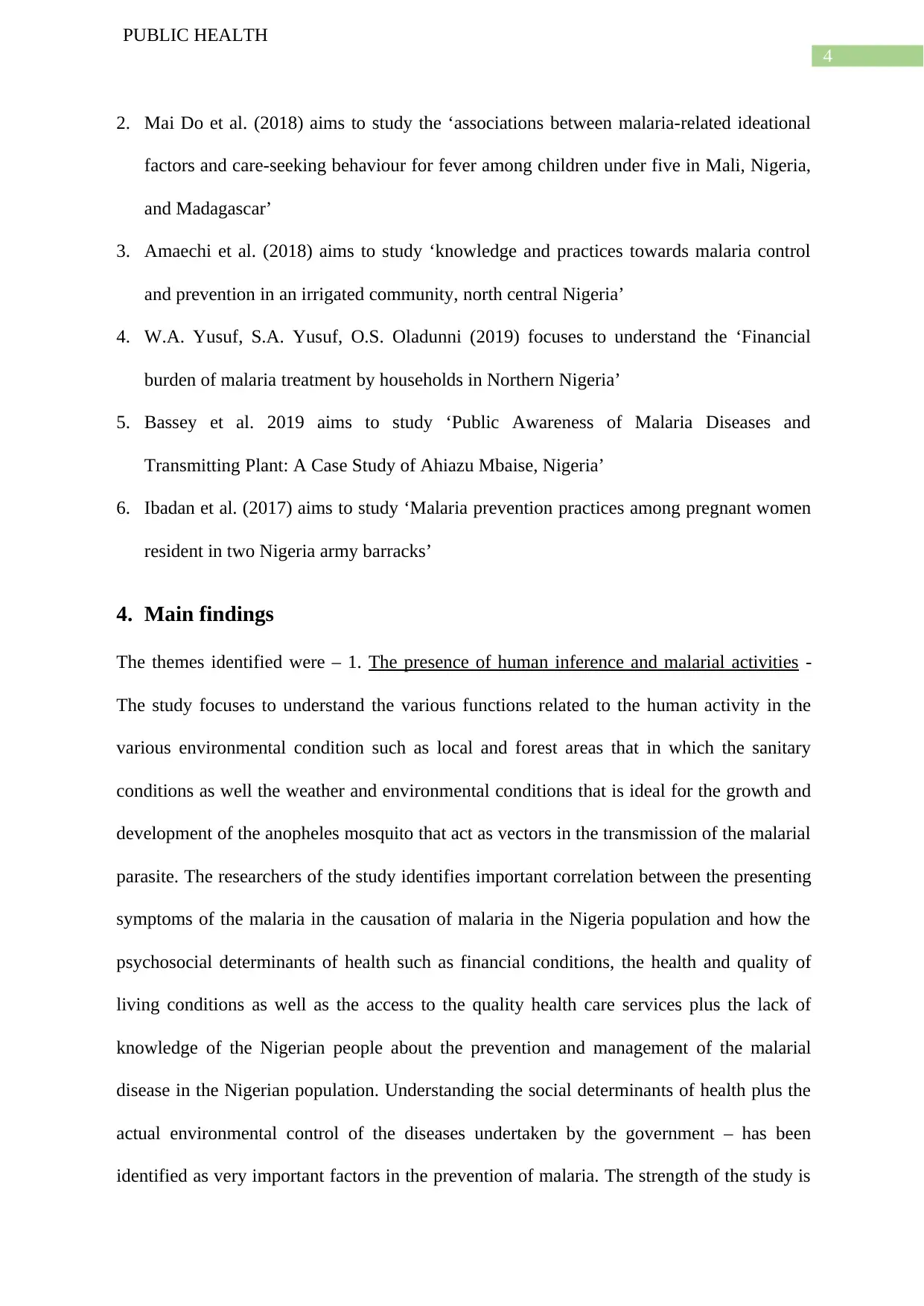
4
PUBLIC HEALTH
2. Mai Do et al. (2018) aims to study the ‘associations between malaria-related ideational
factors and care-seeking behaviour for fever among children under five in Mali, Nigeria,
and Madagascar’
3. Amaechi et al. (2018) aims to study ‘knowledge and practices towards malaria control
and prevention in an irrigated community, north central Nigeria’
4. W.A. Yusuf, S.A. Yusuf, O.S. Oladunni (2019) focuses to understand the ‘Financial
burden of malaria treatment by households in Northern Nigeria’
5. Bassey et al. 2019 aims to study ‘Public Awareness of Malaria Diseases and
Transmitting Plant: A Case Study of Ahiazu Mbaise, Nigeria’
6. Ibadan et al. (2017) aims to study ‘Malaria prevention practices among pregnant women
resident in two Nigeria army barracks’
4. Main findings
The themes identified were – 1. The presence of human inference and malarial activities -
The study focuses to understand the various functions related to the human activity in the
various environmental condition such as local and forest areas that in which the sanitary
conditions as well the weather and environmental conditions that is ideal for the growth and
development of the anopheles mosquito that act as vectors in the transmission of the malarial
parasite. The researchers of the study identifies important correlation between the presenting
symptoms of the malaria in the causation of malaria in the Nigeria population and how the
psychosocial determinants of health such as financial conditions, the health and quality of
living conditions as well as the access to the quality health care services plus the lack of
knowledge of the Nigerian people about the prevention and management of the malarial
disease in the Nigerian population. Understanding the social determinants of health plus the
actual environmental control of the diseases undertaken by the government – has been
identified as very important factors in the prevention of malaria. The strength of the study is
PUBLIC HEALTH
2. Mai Do et al. (2018) aims to study the ‘associations between malaria-related ideational
factors and care-seeking behaviour for fever among children under five in Mali, Nigeria,
and Madagascar’
3. Amaechi et al. (2018) aims to study ‘knowledge and practices towards malaria control
and prevention in an irrigated community, north central Nigeria’
4. W.A. Yusuf, S.A. Yusuf, O.S. Oladunni (2019) focuses to understand the ‘Financial
burden of malaria treatment by households in Northern Nigeria’
5. Bassey et al. 2019 aims to study ‘Public Awareness of Malaria Diseases and
Transmitting Plant: A Case Study of Ahiazu Mbaise, Nigeria’
6. Ibadan et al. (2017) aims to study ‘Malaria prevention practices among pregnant women
resident in two Nigeria army barracks’
4. Main findings
The themes identified were – 1. The presence of human inference and malarial activities -
The study focuses to understand the various functions related to the human activity in the
various environmental condition such as local and forest areas that in which the sanitary
conditions as well the weather and environmental conditions that is ideal for the growth and
development of the anopheles mosquito that act as vectors in the transmission of the malarial
parasite. The researchers of the study identifies important correlation between the presenting
symptoms of the malaria in the causation of malaria in the Nigeria population and how the
psychosocial determinants of health such as financial conditions, the health and quality of
living conditions as well as the access to the quality health care services plus the lack of
knowledge of the Nigerian people about the prevention and management of the malarial
disease in the Nigerian population. Understanding the social determinants of health plus the
actual environmental control of the diseases undertaken by the government – has been
identified as very important factors in the prevention of malaria. The strength of the study is
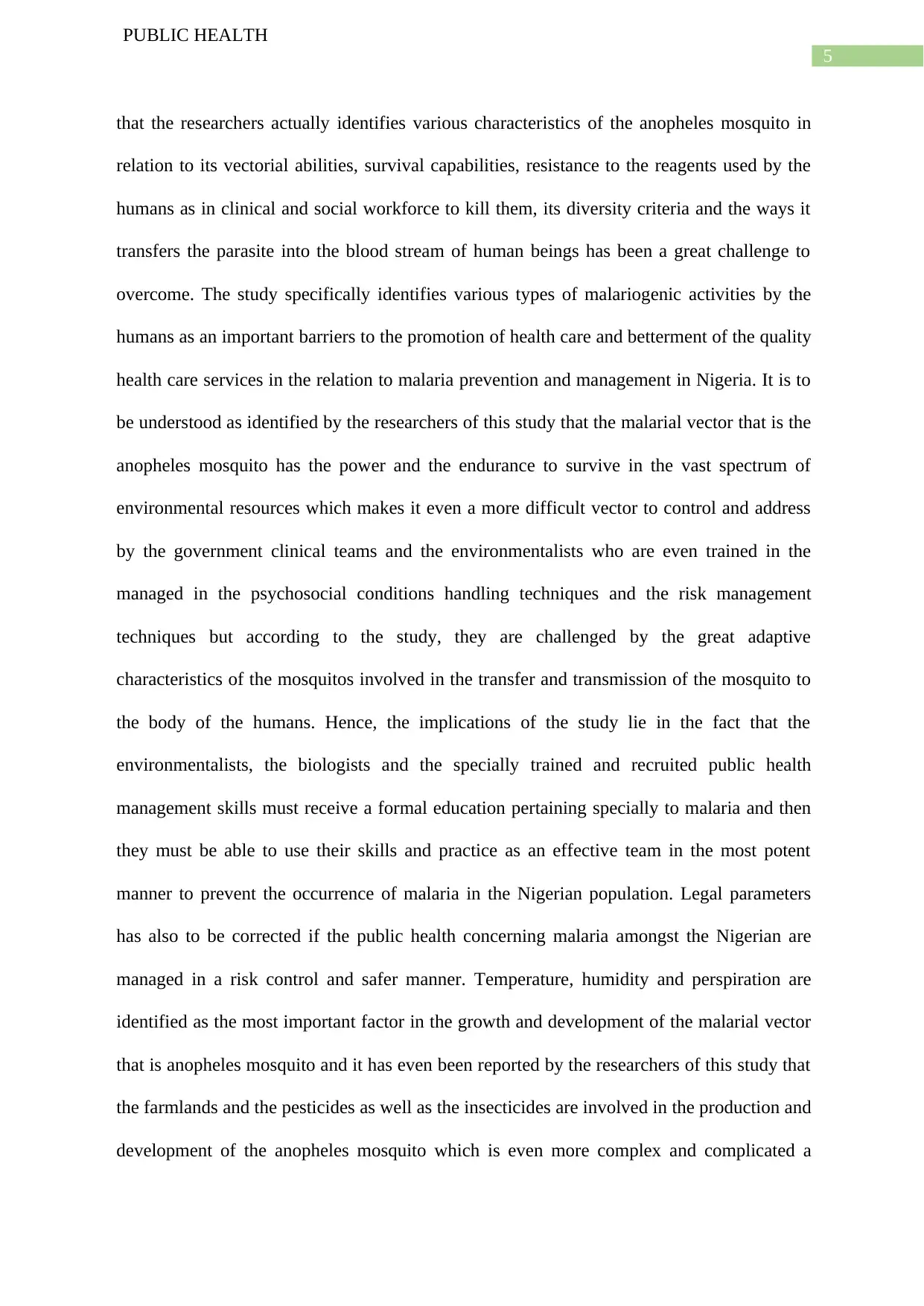
5
PUBLIC HEALTH
that the researchers actually identifies various characteristics of the anopheles mosquito in
relation to its vectorial abilities, survival capabilities, resistance to the reagents used by the
humans as in clinical and social workforce to kill them, its diversity criteria and the ways it
transfers the parasite into the blood stream of human beings has been a great challenge to
overcome. The study specifically identifies various types of malariogenic activities by the
humans as an important barriers to the promotion of health care and betterment of the quality
health care services in the relation to malaria prevention and management in Nigeria. It is to
be understood as identified by the researchers of this study that the malarial vector that is the
anopheles mosquito has the power and the endurance to survive in the vast spectrum of
environmental resources which makes it even a more difficult vector to control and address
by the government clinical teams and the environmentalists who are even trained in the
managed in the psychosocial conditions handling techniques and the risk management
techniques but according to the study, they are challenged by the great adaptive
characteristics of the mosquitos involved in the transfer and transmission of the mosquito to
the body of the humans. Hence, the implications of the study lie in the fact that the
environmentalists, the biologists and the specially trained and recruited public health
management skills must receive a formal education pertaining specially to malaria and then
they must be able to use their skills and practice as an effective team in the most potent
manner to prevent the occurrence of malaria in the Nigerian population. Legal parameters
has also to be corrected if the public health concerning malaria amongst the Nigerian are
managed in a risk control and safer manner. Temperature, humidity and perspiration are
identified as the most important factor in the growth and development of the malarial vector
that is anopheles mosquito and it has even been reported by the researchers of this study that
the farmlands and the pesticides as well as the insecticides are involved in the production and
development of the anopheles mosquito which is even more complex and complicated a
PUBLIC HEALTH
that the researchers actually identifies various characteristics of the anopheles mosquito in
relation to its vectorial abilities, survival capabilities, resistance to the reagents used by the
humans as in clinical and social workforce to kill them, its diversity criteria and the ways it
transfers the parasite into the blood stream of human beings has been a great challenge to
overcome. The study specifically identifies various types of malariogenic activities by the
humans as an important barriers to the promotion of health care and betterment of the quality
health care services in the relation to malaria prevention and management in Nigeria. It is to
be understood as identified by the researchers of this study that the malarial vector that is the
anopheles mosquito has the power and the endurance to survive in the vast spectrum of
environmental resources which makes it even a more difficult vector to control and address
by the government clinical teams and the environmentalists who are even trained in the
managed in the psychosocial conditions handling techniques and the risk management
techniques but according to the study, they are challenged by the great adaptive
characteristics of the mosquitos involved in the transfer and transmission of the mosquito to
the body of the humans. Hence, the implications of the study lie in the fact that the
environmentalists, the biologists and the specially trained and recruited public health
management skills must receive a formal education pertaining specially to malaria and then
they must be able to use their skills and practice as an effective team in the most potent
manner to prevent the occurrence of malaria in the Nigerian population. Legal parameters
has also to be corrected if the public health concerning malaria amongst the Nigerian are
managed in a risk control and safer manner. Temperature, humidity and perspiration are
identified as the most important factor in the growth and development of the malarial vector
that is anopheles mosquito and it has even been reported by the researchers of this study that
the farmlands and the pesticides as well as the insecticides are involved in the production and
development of the anopheles mosquito which is even more complex and complicated a
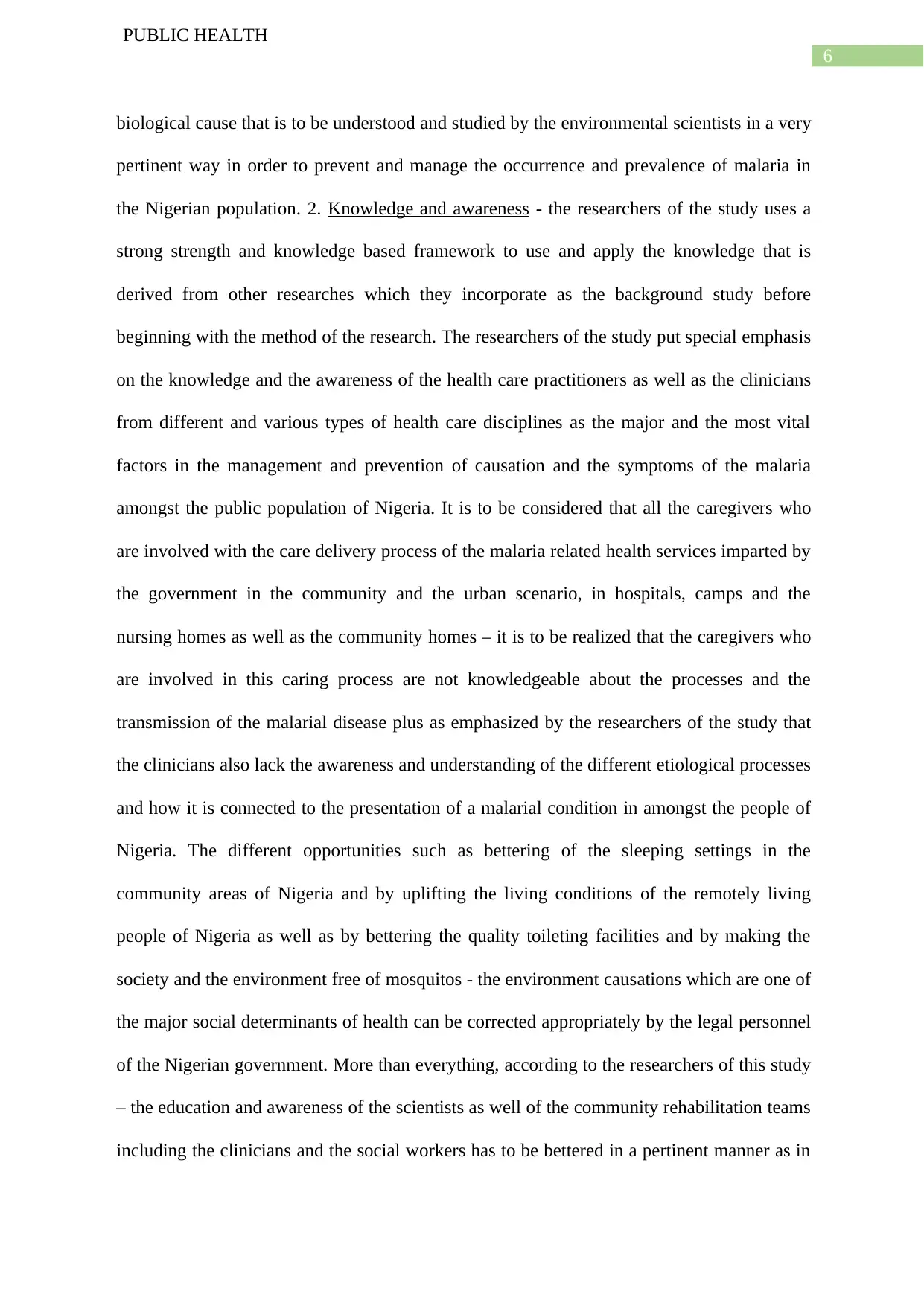
6
PUBLIC HEALTH
biological cause that is to be understood and studied by the environmental scientists in a very
pertinent way in order to prevent and manage the occurrence and prevalence of malaria in
the Nigerian population. 2. Knowledge and awareness - the researchers of the study uses a
strong strength and knowledge based framework to use and apply the knowledge that is
derived from other researches which they incorporate as the background study before
beginning with the method of the research. The researchers of the study put special emphasis
on the knowledge and the awareness of the health care practitioners as well as the clinicians
from different and various types of health care disciplines as the major and the most vital
factors in the management and prevention of causation and the symptoms of the malaria
amongst the public population of Nigeria. It is to be considered that all the caregivers who
are involved with the care delivery process of the malaria related health services imparted by
the government in the community and the urban scenario, in hospitals, camps and the
nursing homes as well as the community homes – it is to be realized that the caregivers who
are involved in this caring process are not knowledgeable about the processes and the
transmission of the malarial disease plus as emphasized by the researchers of the study that
the clinicians also lack the awareness and understanding of the different etiological processes
and how it is connected to the presentation of a malarial condition in amongst the people of
Nigeria. The different opportunities such as bettering of the sleeping settings in the
community areas of Nigeria and by uplifting the living conditions of the remotely living
people of Nigeria as well as by bettering the quality toileting facilities and by making the
society and the environment free of mosquitos - the environment causations which are one of
the major social determinants of health can be corrected appropriately by the legal personnel
of the Nigerian government. More than everything, according to the researchers of this study
– the education and awareness of the scientists as well of the community rehabilitation teams
including the clinicians and the social workers has to be bettered in a pertinent manner as in
PUBLIC HEALTH
biological cause that is to be understood and studied by the environmental scientists in a very
pertinent way in order to prevent and manage the occurrence and prevalence of malaria in
the Nigerian population. 2. Knowledge and awareness - the researchers of the study uses a
strong strength and knowledge based framework to use and apply the knowledge that is
derived from other researches which they incorporate as the background study before
beginning with the method of the research. The researchers of the study put special emphasis
on the knowledge and the awareness of the health care practitioners as well as the clinicians
from different and various types of health care disciplines as the major and the most vital
factors in the management and prevention of causation and the symptoms of the malaria
amongst the public population of Nigeria. It is to be considered that all the caregivers who
are involved with the care delivery process of the malaria related health services imparted by
the government in the community and the urban scenario, in hospitals, camps and the
nursing homes as well as the community homes – it is to be realized that the caregivers who
are involved in this caring process are not knowledgeable about the processes and the
transmission of the malarial disease plus as emphasized by the researchers of the study that
the clinicians also lack the awareness and understanding of the different etiological processes
and how it is connected to the presentation of a malarial condition in amongst the people of
Nigeria. The different opportunities such as bettering of the sleeping settings in the
community areas of Nigeria and by uplifting the living conditions of the remotely living
people of Nigeria as well as by bettering the quality toileting facilities and by making the
society and the environment free of mosquitos - the environment causations which are one of
the major social determinants of health can be corrected appropriately by the legal personnel
of the Nigerian government. More than everything, according to the researchers of this study
– the education and awareness of the scientists as well of the community rehabilitation teams
including the clinicians and the social workers has to be bettered in a pertinent manner as in
Paraphrase This Document
Need a fresh take? Get an instant paraphrase of this document with our AI Paraphraser
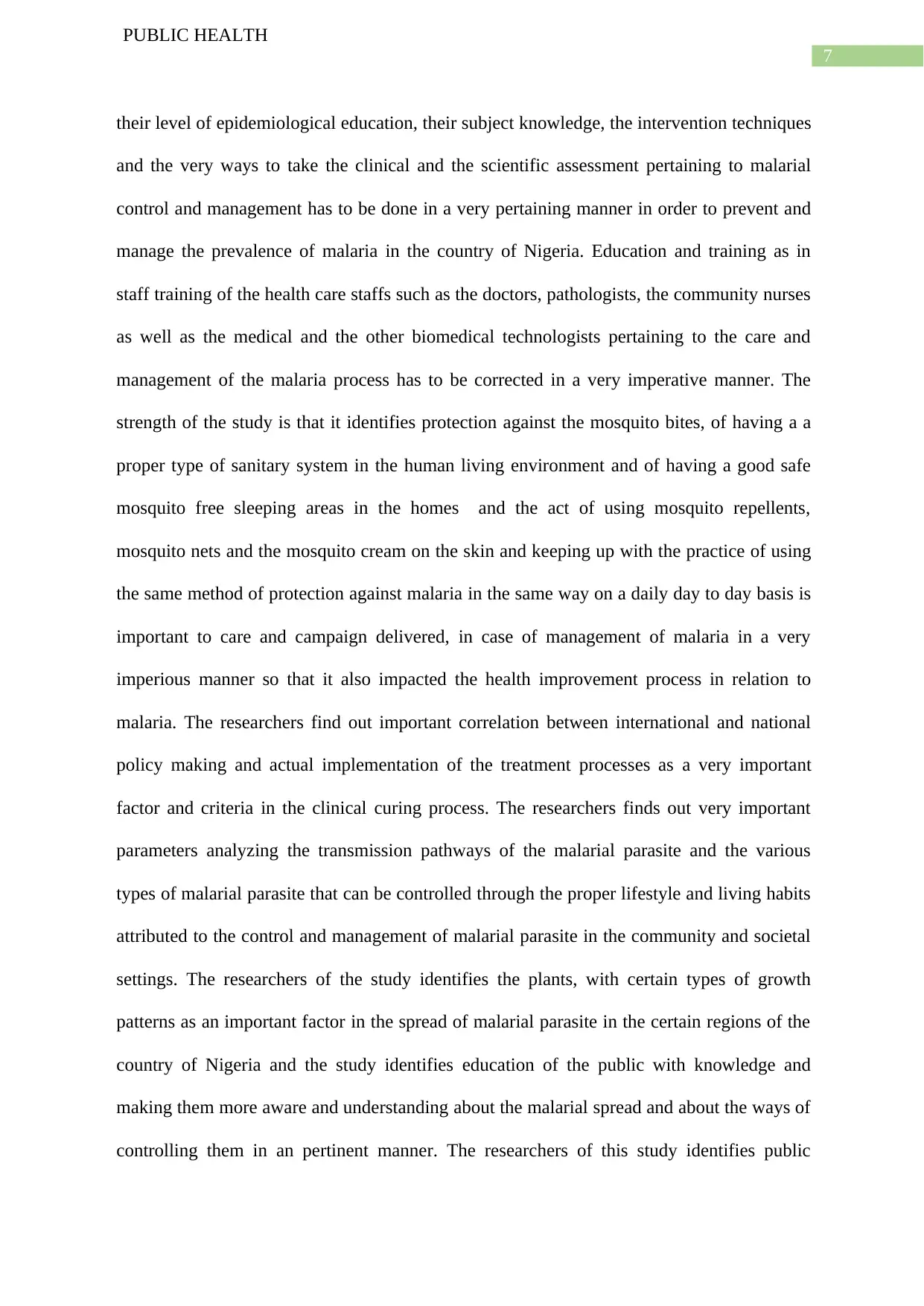
7
PUBLIC HEALTH
their level of epidemiological education, their subject knowledge, the intervention techniques
and the very ways to take the clinical and the scientific assessment pertaining to malarial
control and management has to be done in a very pertaining manner in order to prevent and
manage the prevalence of malaria in the country of Nigeria. Education and training as in
staff training of the health care staffs such as the doctors, pathologists, the community nurses
as well as the medical and the other biomedical technologists pertaining to the care and
management of the malaria process has to be corrected in a very imperative manner. The
strength of the study is that it identifies protection against the mosquito bites, of having a a
proper type of sanitary system in the human living environment and of having a good safe
mosquito free sleeping areas in the homes and the act of using mosquito repellents,
mosquito nets and the mosquito cream on the skin and keeping up with the practice of using
the same method of protection against malaria in the same way on a daily day to day basis is
important to care and campaign delivered, in case of management of malaria in a very
imperious manner so that it also impacted the health improvement process in relation to
malaria. The researchers find out important correlation between international and national
policy making and actual implementation of the treatment processes as a very important
factor and criteria in the clinical curing process. The researchers finds out very important
parameters analyzing the transmission pathways of the malarial parasite and the various
types of malarial parasite that can be controlled through the proper lifestyle and living habits
attributed to the control and management of malarial parasite in the community and societal
settings. The researchers of the study identifies the plants, with certain types of growth
patterns as an important factor in the spread of malarial parasite in the certain regions of the
country of Nigeria and the study identifies education of the public with knowledge and
making them more aware and understanding about the malarial spread and about the ways of
controlling them in an pertinent manner. The researchers of this study identifies public
PUBLIC HEALTH
their level of epidemiological education, their subject knowledge, the intervention techniques
and the very ways to take the clinical and the scientific assessment pertaining to malarial
control and management has to be done in a very pertaining manner in order to prevent and
manage the prevalence of malaria in the country of Nigeria. Education and training as in
staff training of the health care staffs such as the doctors, pathologists, the community nurses
as well as the medical and the other biomedical technologists pertaining to the care and
management of the malaria process has to be corrected in a very imperative manner. The
strength of the study is that it identifies protection against the mosquito bites, of having a a
proper type of sanitary system in the human living environment and of having a good safe
mosquito free sleeping areas in the homes and the act of using mosquito repellents,
mosquito nets and the mosquito cream on the skin and keeping up with the practice of using
the same method of protection against malaria in the same way on a daily day to day basis is
important to care and campaign delivered, in case of management of malaria in a very
imperious manner so that it also impacted the health improvement process in relation to
malaria. The researchers find out important correlation between international and national
policy making and actual implementation of the treatment processes as a very important
factor and criteria in the clinical curing process. The researchers finds out very important
parameters analyzing the transmission pathways of the malarial parasite and the various
types of malarial parasite that can be controlled through the proper lifestyle and living habits
attributed to the control and management of malarial parasite in the community and societal
settings. The researchers of the study identifies the plants, with certain types of growth
patterns as an important factor in the spread of malarial parasite in the certain regions of the
country of Nigeria and the study identifies education of the public with knowledge and
making them more aware and understanding about the malarial spread and about the ways of
controlling them in an pertinent manner. The researchers of this study identifies public
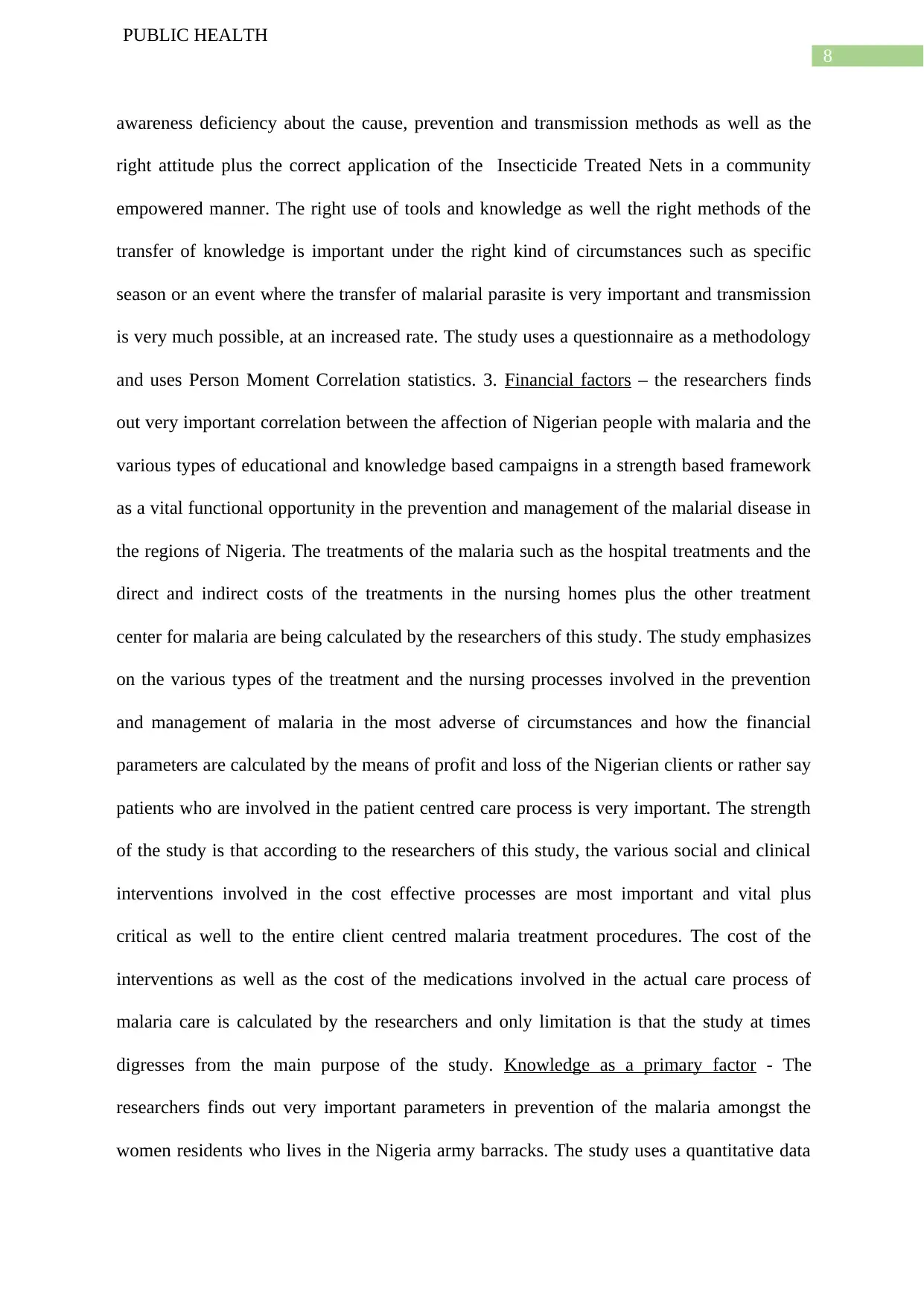
8
PUBLIC HEALTH
awareness deficiency about the cause, prevention and transmission methods as well as the
right attitude plus the correct application of the Insecticide Treated Nets in a community
empowered manner. The right use of tools and knowledge as well the right methods of the
transfer of knowledge is important under the right kind of circumstances such as specific
season or an event where the transfer of malarial parasite is very important and transmission
is very much possible, at an increased rate. The study uses a questionnaire as a methodology
and uses Person Moment Correlation statistics. 3. Financial factors – the researchers finds
out very important correlation between the affection of Nigerian people with malaria and the
various types of educational and knowledge based campaigns in a strength based framework
as a vital functional opportunity in the prevention and management of the malarial disease in
the regions of Nigeria. The treatments of the malaria such as the hospital treatments and the
direct and indirect costs of the treatments in the nursing homes plus the other treatment
center for malaria are being calculated by the researchers of this study. The study emphasizes
on the various types of the treatment and the nursing processes involved in the prevention
and management of malaria in the most adverse of circumstances and how the financial
parameters are calculated by the means of profit and loss of the Nigerian clients or rather say
patients who are involved in the patient centred care process is very important. The strength
of the study is that according to the researchers of this study, the various social and clinical
interventions involved in the cost effective processes are most important and vital plus
critical as well to the entire client centred malaria treatment procedures. The cost of the
interventions as well as the cost of the medications involved in the actual care process of
malaria care is calculated by the researchers and only limitation is that the study at times
digresses from the main purpose of the study. Knowledge as a primary factor - The
researchers finds out very important parameters in prevention of the malaria amongst the
women residents who lives in the Nigeria army barracks. The study uses a quantitative data
PUBLIC HEALTH
awareness deficiency about the cause, prevention and transmission methods as well as the
right attitude plus the correct application of the Insecticide Treated Nets in a community
empowered manner. The right use of tools and knowledge as well the right methods of the
transfer of knowledge is important under the right kind of circumstances such as specific
season or an event where the transfer of malarial parasite is very important and transmission
is very much possible, at an increased rate. The study uses a questionnaire as a methodology
and uses Person Moment Correlation statistics. 3. Financial factors – the researchers finds
out very important correlation between the affection of Nigerian people with malaria and the
various types of educational and knowledge based campaigns in a strength based framework
as a vital functional opportunity in the prevention and management of the malarial disease in
the regions of Nigeria. The treatments of the malaria such as the hospital treatments and the
direct and indirect costs of the treatments in the nursing homes plus the other treatment
center for malaria are being calculated by the researchers of this study. The study emphasizes
on the various types of the treatment and the nursing processes involved in the prevention
and management of malaria in the most adverse of circumstances and how the financial
parameters are calculated by the means of profit and loss of the Nigerian clients or rather say
patients who are involved in the patient centred care process is very important. The strength
of the study is that according to the researchers of this study, the various social and clinical
interventions involved in the cost effective processes are most important and vital plus
critical as well to the entire client centred malaria treatment procedures. The cost of the
interventions as well as the cost of the medications involved in the actual care process of
malaria care is calculated by the researchers and only limitation is that the study at times
digresses from the main purpose of the study. Knowledge as a primary factor - The
researchers finds out very important parameters in prevention of the malaria amongst the
women residents who lives in the Nigeria army barracks. The study uses a quantitative data
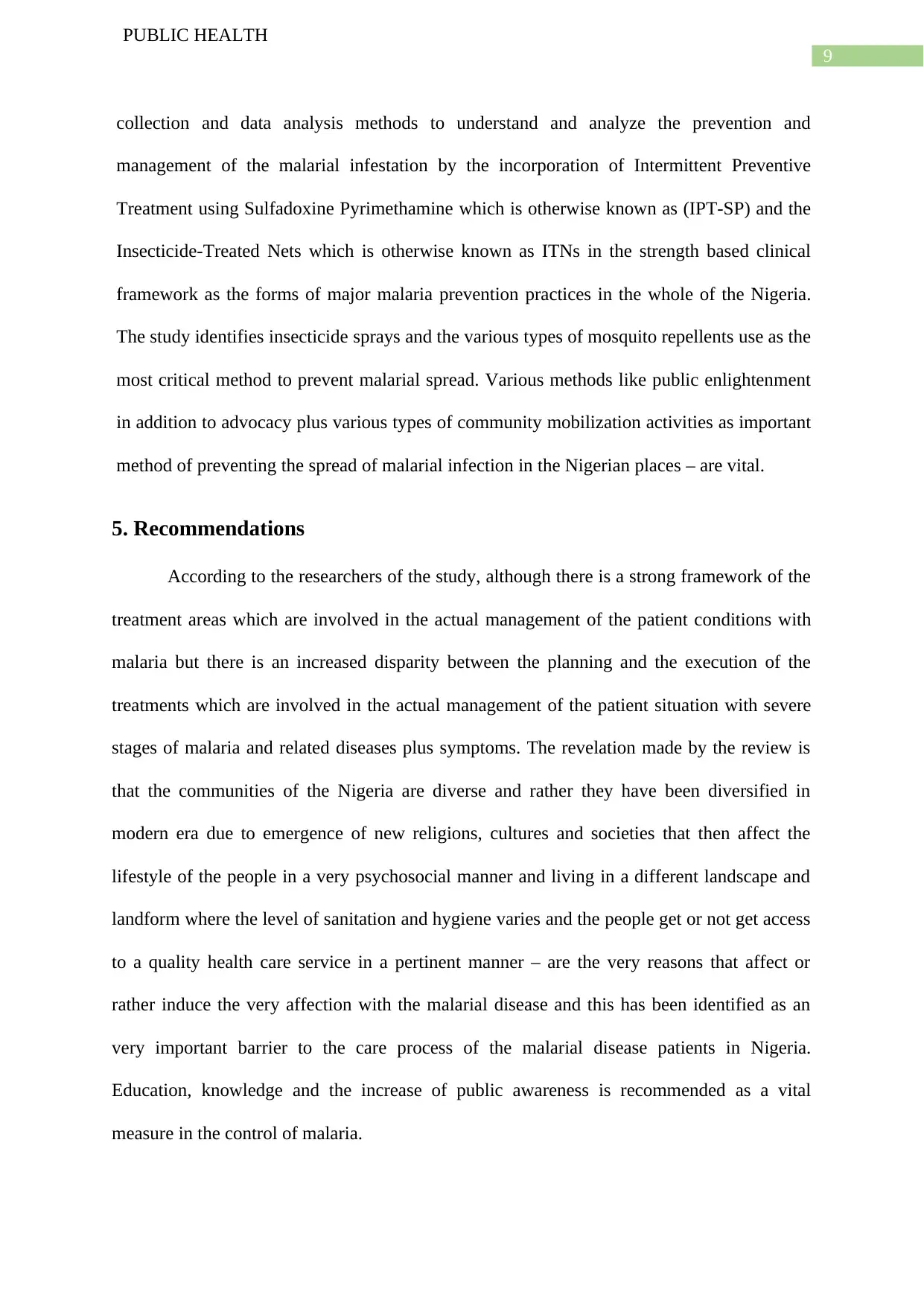
9
PUBLIC HEALTH
collection and data analysis methods to understand and analyze the prevention and
management of the malarial infestation by the incorporation of Intermittent Preventive
Treatment using Sulfadoxine Pyrimethamine which is otherwise known as (IPT-SP) and the
Insecticide-Treated Nets which is otherwise known as ITNs in the strength based clinical
framework as the forms of major malaria prevention practices in the whole of the Nigeria.
The study identifies insecticide sprays and the various types of mosquito repellents use as the
most critical method to prevent malarial spread. Various methods like public enlightenment
in addition to advocacy plus various types of community mobilization activities as important
method of preventing the spread of malarial infection in the Nigerian places – are vital.
5. Recommendations
According to the researchers of the study, although there is a strong framework of the
treatment areas which are involved in the actual management of the patient conditions with
malaria but there is an increased disparity between the planning and the execution of the
treatments which are involved in the actual management of the patient situation with severe
stages of malaria and related diseases plus symptoms. The revelation made by the review is
that the communities of the Nigeria are diverse and rather they have been diversified in
modern era due to emergence of new religions, cultures and societies that then affect the
lifestyle of the people in a very psychosocial manner and living in a different landscape and
landform where the level of sanitation and hygiene varies and the people get or not get access
to a quality health care service in a pertinent manner – are the very reasons that affect or
rather induce the very affection with the malarial disease and this has been identified as an
very important barrier to the care process of the malarial disease patients in Nigeria.
Education, knowledge and the increase of public awareness is recommended as a vital
measure in the control of malaria.
PUBLIC HEALTH
collection and data analysis methods to understand and analyze the prevention and
management of the malarial infestation by the incorporation of Intermittent Preventive
Treatment using Sulfadoxine Pyrimethamine which is otherwise known as (IPT-SP) and the
Insecticide-Treated Nets which is otherwise known as ITNs in the strength based clinical
framework as the forms of major malaria prevention practices in the whole of the Nigeria.
The study identifies insecticide sprays and the various types of mosquito repellents use as the
most critical method to prevent malarial spread. Various methods like public enlightenment
in addition to advocacy plus various types of community mobilization activities as important
method of preventing the spread of malarial infection in the Nigerian places – are vital.
5. Recommendations
According to the researchers of the study, although there is a strong framework of the
treatment areas which are involved in the actual management of the patient conditions with
malaria but there is an increased disparity between the planning and the execution of the
treatments which are involved in the actual management of the patient situation with severe
stages of malaria and related diseases plus symptoms. The revelation made by the review is
that the communities of the Nigeria are diverse and rather they have been diversified in
modern era due to emergence of new religions, cultures and societies that then affect the
lifestyle of the people in a very psychosocial manner and living in a different landscape and
landform where the level of sanitation and hygiene varies and the people get or not get access
to a quality health care service in a pertinent manner – are the very reasons that affect or
rather induce the very affection with the malarial disease and this has been identified as an
very important barrier to the care process of the malarial disease patients in Nigeria.
Education, knowledge and the increase of public awareness is recommended as a vital
measure in the control of malaria.
Secure Best Marks with AI Grader
Need help grading? Try our AI Grader for instant feedback on your assignments.
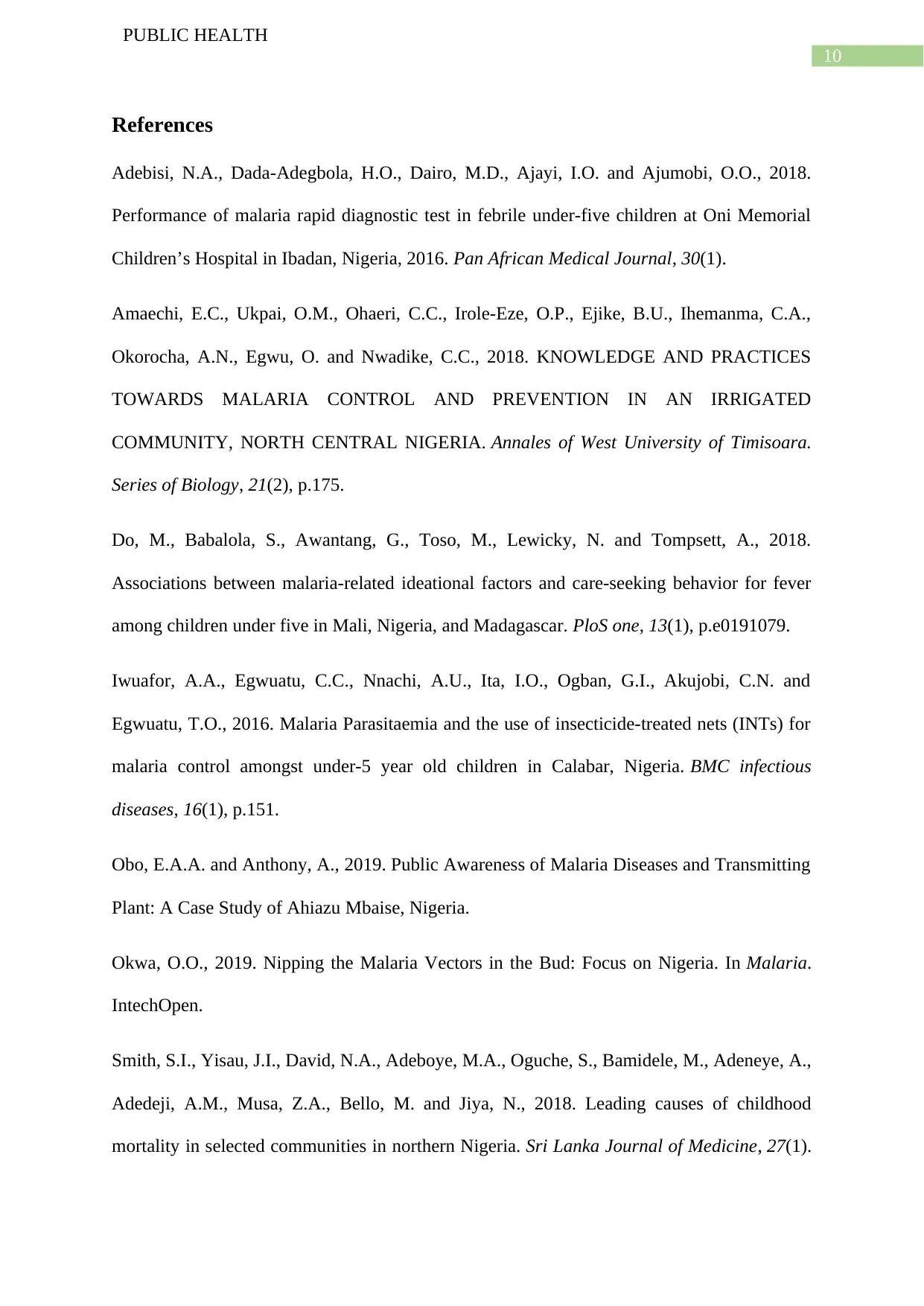
10
PUBLIC HEALTH
References
Adebisi, N.A., Dada-Adegbola, H.O., Dairo, M.D., Ajayi, I.O. and Ajumobi, O.O., 2018.
Performance of malaria rapid diagnostic test in febrile under-five children at Oni Memorial
Children’s Hospital in Ibadan, Nigeria, 2016. Pan African Medical Journal, 30(1).
Amaechi, E.C., Ukpai, O.M., Ohaeri, C.C., Irole-Eze, O.P., Ejike, B.U., Ihemanma, C.A.,
Okorocha, A.N., Egwu, O. and Nwadike, C.C., 2018. KNOWLEDGE AND PRACTICES
TOWARDS MALARIA CONTROL AND PREVENTION IN AN IRRIGATED
COMMUNITY, NORTH CENTRAL NIGERIA. Annales of West University of Timisoara.
Series of Biology, 21(2), p.175.
Do, M., Babalola, S., Awantang, G., Toso, M., Lewicky, N. and Tompsett, A., 2018.
Associations between malaria-related ideational factors and care-seeking behavior for fever
among children under five in Mali, Nigeria, and Madagascar. PloS one, 13(1), p.e0191079.
Iwuafor, A.A., Egwuatu, C.C., Nnachi, A.U., Ita, I.O., Ogban, G.I., Akujobi, C.N. and
Egwuatu, T.O., 2016. Malaria Parasitaemia and the use of insecticide-treated nets (INTs) for
malaria control amongst under-5 year old children in Calabar, Nigeria. BMC infectious
diseases, 16(1), p.151.
Obo, E.A.A. and Anthony, A., 2019. Public Awareness of Malaria Diseases and Transmitting
Plant: A Case Study of Ahiazu Mbaise, Nigeria.
Okwa, O.O., 2019. Nipping the Malaria Vectors in the Bud: Focus on Nigeria. In Malaria.
IntechOpen.
Smith, S.I., Yisau, J.I., David, N.A., Adeboye, M.A., Oguche, S., Bamidele, M., Adeneye, A.,
Adedeji, A.M., Musa, Z.A., Bello, M. and Jiya, N., 2018. Leading causes of childhood
mortality in selected communities in northern Nigeria. Sri Lanka Journal of Medicine, 27(1).
PUBLIC HEALTH
References
Adebisi, N.A., Dada-Adegbola, H.O., Dairo, M.D., Ajayi, I.O. and Ajumobi, O.O., 2018.
Performance of malaria rapid diagnostic test in febrile under-five children at Oni Memorial
Children’s Hospital in Ibadan, Nigeria, 2016. Pan African Medical Journal, 30(1).
Amaechi, E.C., Ukpai, O.M., Ohaeri, C.C., Irole-Eze, O.P., Ejike, B.U., Ihemanma, C.A.,
Okorocha, A.N., Egwu, O. and Nwadike, C.C., 2018. KNOWLEDGE AND PRACTICES
TOWARDS MALARIA CONTROL AND PREVENTION IN AN IRRIGATED
COMMUNITY, NORTH CENTRAL NIGERIA. Annales of West University of Timisoara.
Series of Biology, 21(2), p.175.
Do, M., Babalola, S., Awantang, G., Toso, M., Lewicky, N. and Tompsett, A., 2018.
Associations between malaria-related ideational factors and care-seeking behavior for fever
among children under five in Mali, Nigeria, and Madagascar. PloS one, 13(1), p.e0191079.
Iwuafor, A.A., Egwuatu, C.C., Nnachi, A.U., Ita, I.O., Ogban, G.I., Akujobi, C.N. and
Egwuatu, T.O., 2016. Malaria Parasitaemia and the use of insecticide-treated nets (INTs) for
malaria control amongst under-5 year old children in Calabar, Nigeria. BMC infectious
diseases, 16(1), p.151.
Obo, E.A.A. and Anthony, A., 2019. Public Awareness of Malaria Diseases and Transmitting
Plant: A Case Study of Ahiazu Mbaise, Nigeria.
Okwa, O.O., 2019. Nipping the Malaria Vectors in the Bud: Focus on Nigeria. In Malaria.
IntechOpen.
Smith, S.I., Yisau, J.I., David, N.A., Adeboye, M.A., Oguche, S., Bamidele, M., Adeneye, A.,
Adedeji, A.M., Musa, Z.A., Bello, M. and Jiya, N., 2018. Leading causes of childhood
mortality in selected communities in northern Nigeria. Sri Lanka Journal of Medicine, 27(1).
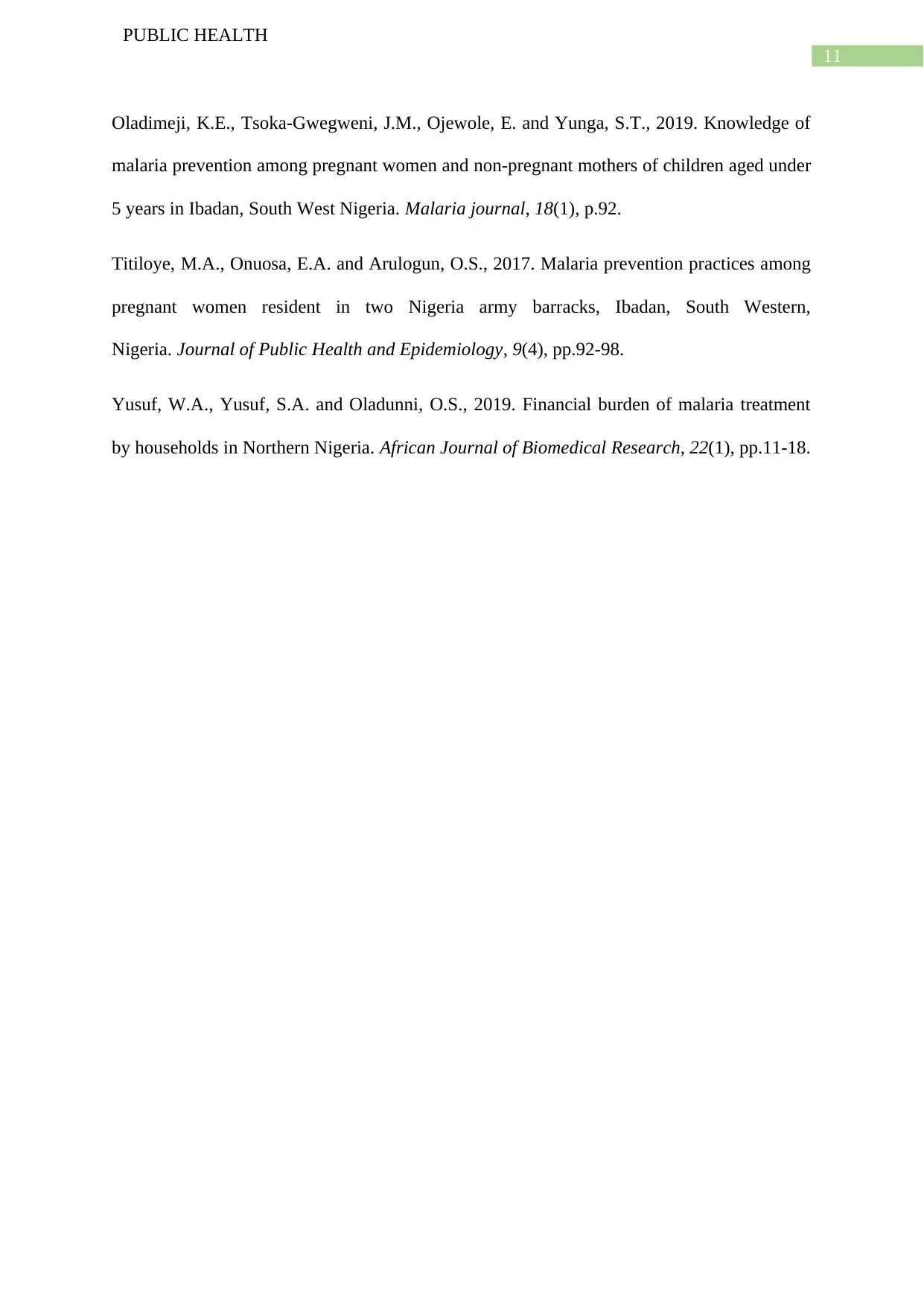
11
PUBLIC HEALTH
Oladimeji, K.E., Tsoka-Gwegweni, J.M., Ojewole, E. and Yunga, S.T., 2019. Knowledge of
malaria prevention among pregnant women and non-pregnant mothers of children aged under
5 years in Ibadan, South West Nigeria. Malaria journal, 18(1), p.92.
Titiloye, M.A., Onuosa, E.A. and Arulogun, O.S., 2017. Malaria prevention practices among
pregnant women resident in two Nigeria army barracks, Ibadan, South Western,
Nigeria. Journal of Public Health and Epidemiology, 9(4), pp.92-98.
Yusuf, W.A., Yusuf, S.A. and Oladunni, O.S., 2019. Financial burden of malaria treatment
by households in Northern Nigeria. African Journal of Biomedical Research, 22(1), pp.11-18.
PUBLIC HEALTH
Oladimeji, K.E., Tsoka-Gwegweni, J.M., Ojewole, E. and Yunga, S.T., 2019. Knowledge of
malaria prevention among pregnant women and non-pregnant mothers of children aged under
5 years in Ibadan, South West Nigeria. Malaria journal, 18(1), p.92.
Titiloye, M.A., Onuosa, E.A. and Arulogun, O.S., 2017. Malaria prevention practices among
pregnant women resident in two Nigeria army barracks, Ibadan, South Western,
Nigeria. Journal of Public Health and Epidemiology, 9(4), pp.92-98.
Yusuf, W.A., Yusuf, S.A. and Oladunni, O.S., 2019. Financial burden of malaria treatment
by households in Northern Nigeria. African Journal of Biomedical Research, 22(1), pp.11-18.
1 out of 12
Related Documents
Your All-in-One AI-Powered Toolkit for Academic Success.
+13062052269
info@desklib.com
Available 24*7 on WhatsApp / Email
![[object Object]](/_next/static/media/star-bottom.7253800d.svg)
Unlock your academic potential
© 2024 | Zucol Services PVT LTD | All rights reserved.





